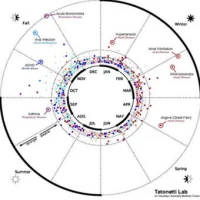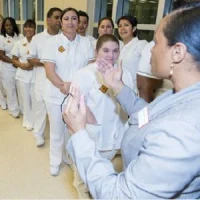A new report estimates that the defunding of medical residency training programs in underserved areas of the United States will affect millions of patients who do not have easy access to primary care physicians. Researchers from the George Washington University Milken Institute School of Public Health warn that discontinued support for the Teaching Health Centers program will worsen the shortage of primary care physicians trained to serve many rural and urban communities.
Prioritising Primary Care Training
The Teaching Health Centers (THC) program, which began in 2011, trains medical residents in communities with shortages of primary care physicians and dentists. It is based in clinical training sites such as community health centres found in areas that are economically or medically vulnerable or geographically isolated. One of the aims of the program is to fill gaps which appear as a result of the graduate medical education (GME) system that rewards residency programs based in hospitals, many of which produce specialists instead of primary care physicians.
Financial resources for the support of the THC program have already been reduced, and could be lost altogether if Congress does not appropriate new funding for the 2015 fiscal year. Extended funding would allow current THC residents to continue their training. Upon graduation, they are expected to provide primary care services to up to one million patients per year. There are currently 60 THC programs in operation in 27 states and the District of Columbia.
Shortage of Community-Based Care
"The current GME system does not promote community-based primary care training opportunities, despite the enduring national need for physicians in these settings. The THC programs do just that and it would be a huge loss to stop funding them now--just as they start to graduate physicians ready to practice primary care in shortage areas,” said Fitzhugh Mullan, MD, one of the report’s co-authors and the Murdock Head Professor of Health Policy and Medicine at Milken Institute School of Public Health and Professor of Pediatrics at the George Washington School of Medicine & Health Sciences.
As many as 50 million Americans struggle to access medical services, even if they have insurance coverage, due to their residency in areas which have a shortage of primary care doctors. The THC program makes it possible to train the next generation of doctors who will deliver care to these populations, according to Leighton Ku, PhD, MPH, the report’s lead author and a professor of health policy at Milken Institute School of Public Health.
THC Graduates More Likely To Stay In Neglected Neighbourhoods
Residents who graduate from THC programs are more likely to practice primary care services, and far more likely to stay in underserved areas, compared to graduates of traditional residency programs. The report estimates that 91 percent of THC graduates stay in primary care practice, versus 25 percent of graduates from traditional training programs. Only 8 percent of traditionally trained students remain in underserved areas, compared to 76 percent of THC graduates.
"The THC program helps provide primary care in areas that need it most, and creates a pipeline for sustainable capacity in underserved communities. Without continued support, the Teaching Health Center program will be derailed and that could reduce primary care services in struggling neighbourhoods for years to come,” said Feygele Jacobs, President and CEO of the RCHN Community Health Foundation.
Source: George Washington University Milken Institute School of Public Health
Image Credit: Flickr


![Tuberculosis Diagnostics: The Promise of [18F]FDT PET Imaging Tuberculosis Diagnostics: The Promise of [18F]FDT PET Imaging](https://res.cloudinary.com/healthmanagement-org/image/upload/c_thumb,f_auto,fl_lossy,h_184,q_90,w_500/v1721132076/cw/00127782_cw_image_wi_88cc5f34b1423cec414436d2748b40ce.webp)







